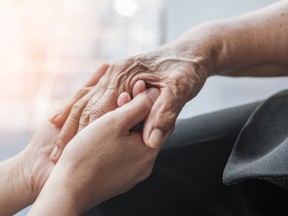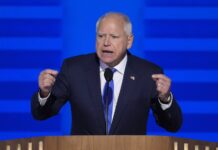“We are hopeful that we are on to something very promising here, and we want to convey that hope to people who carry the burden of this condition.”

Article content
Don Hunter knows the devastation Alzheimer’s brings to a family. It’s that first-hand knowledge that prompted a $4-million gift to forward research through Edmonton’s University Hospital Foundation (UHF).
Over a decade ago, his beloved wife Sophie, now 88, slowly began to change, right in front of his eyes. It was puzzling, but no one put the pieces together at the time.
Advertisement 2
Article content
Article content
A fit woman who loved to golf, Sophie couldn’t find her way home from the Sherwood Park course she’d been golfing at for half a century.
Always a soft-spoken woman, she got even quieter.
As her words disappeared, so did some close social connections.
Sophie’s familiar leisure pursuit of curling became a lonely one.
An American doctor incorrectly suspected sleep apnea to be the culprit of encroaching dementia, so for two years the Hunters went through a succession of CPAP masks in order to find one she’d keep on through the night, all to no avail.
Finally, a heart-breaking diagnosis to go with Sophie Hunter’s deteriorating condition.
Alzheimer’s.
“It’s hard to explain, but (Alzheimer’s) is terrible,” said the Edmonton-area resident.
“Every time I look at her, it brings tears to my eyes. She was a vibrant person, kind and good to those kids and to me. She was my partner.
“She doesn’t think we’re married. That was probably the hardest part. I was just a friend,” Hunter said in an interview.
Prospect for a cure
Don Hunter, 88, spent much of the last decade seeking out some place where advanced research could help with a cure or a treatment.
Article content
Advertisement 3
Article content
A good friend from college had a wife also struggling with dementia, and together they looked for treatments or cures online.
He learned the University Hospital researchers in Edmonton were getting close to human trials, with a team ready to advance to the next stage in the process.
In better days, Don and Sophie Hunter had agreed to give part of their estate to advance science.
“It was in our wills already, so why not give it now when it can do some good?” he said.
“Where else should I donate my money? I always like to donate to things that affect me.”
Don Hunter said his decision was impacted in part by the high cost of dementia, and how many people come down with it — how many families are affected by it.
There’s a neighbour of his whose partner went from golfing daily a few years ago to life in a care facility. Another friend’s wife has dementia, and she’s living in a general hospital while waiting for placement in a care facility.
“When you get older, your chances of getting it are pretty darn high. And your chances of knowing somebody close to you who has it are a hundred per cent,” he said.
Advertisement 4
Article content
“Alzheimer’s affects more people than you think. That’s why I’m donating. Everyone knows someone impacted by the disease and we can do something, now, if we get behind these researchers,” said Hunter.
Leaders at the University Hospital Foundation are hoping Hunter’s gift will inspire a matching $4 million in donations to help find a cure for Alzheimer’s.
Promising new drug
University of Alberta professor and neurologist Dr. Jack Jhamandas has been researching the scourge of Alzheimer’s disease for more than 20 years.
Jhamandas believes he’s on the edge of a promising new drug candidate with the potential to not only prevent, but reverse the devastating effects of Alzheimer’s disease.
In collaboration with Dr. Lorne Tyrell, founding director of the Li Ka Shing Institute of Virology and University of Alberta professor, and Nobel Laureate Sir Michael Houghton, Jhamandas has been advancing the development of treatment to the final phases before beginning human clinical trials.
“The development of novel and effective disease modifying therapies for Alzheimer’s disease is one of the greatest scientific challenges of our time. We are hopeful that we are on to something very promising here, and we want to convey that hope to people who carry the burden of this condition,” Jhamandas said.
Advertisement 5
Article content
Public donation continue momentum
Hunter’s transformational gift gets the University Hospital Foundation part way to the $10 million required to bring the drug to human clinical trials.
President and CEO of the University Hospital Foundation, Dr. Jodi Abbott, urges the public to participate now and continue the critical momentum Hunter started.
“The generous gift Don Hunter has made to the University Hospital Foundation is building the bridge to bring potentially world-changing Alzheimer’s treatment to my family and friends and yours. We urge the public to match Don’s gift and join us in finishing that bridge,” Abbott said.
“It takes support from as small as $100, to the size of Don’s contribution, to fuel the innovative, life-altering treatments and cures needed to end diseases like Alzheimer’s once and for all. This is an opportunity to tackle a significant health challenge and make a difference that will be felt around the globe and in the lives of millions of people.”
Created in 1962, the University Hospital Foundation raises funds to advance patient care and innovation at the University of Alberta Hospital, the Mazankowski Alberta Heart Institute and the Kaye Edmonton Clinic.
More information and donations can be made through the University Hospital Foundation’s website, givetouhf.ca or by contacting Director of Philanthropy Caroline Thompson at 780-900-3084 or caroline.thompson@givetouhf.ca.
Recommended from Editorial
Article content




